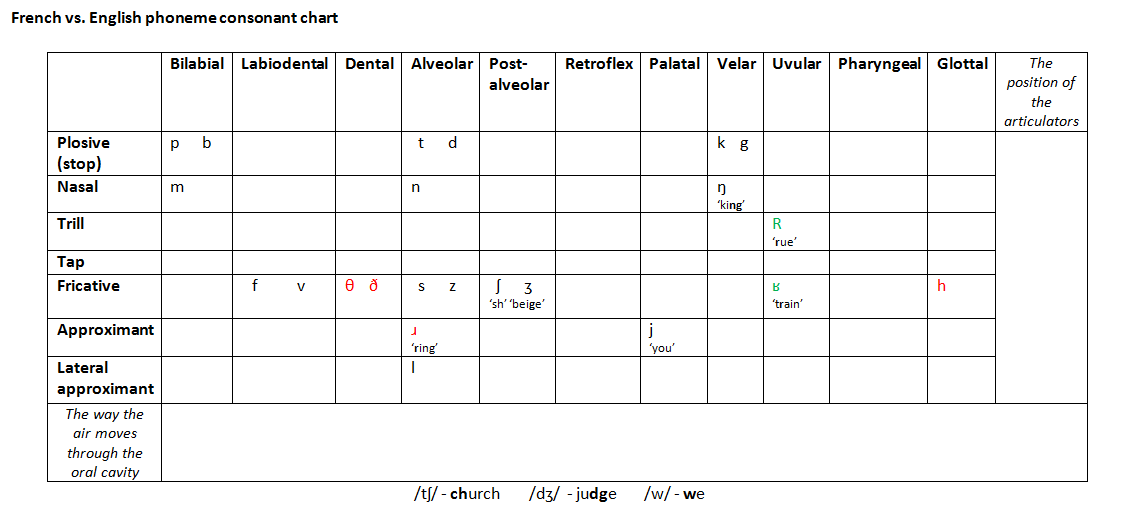Want to know the secret to sounding French?
few weeks ago, a sweet, young française remarked confidently to me: “It iz not ard to say ze ‘h’ in English”.
The difference in vowels and consonants between French and English can make pronunciation very difficult. And it was precisely that: this française could not yet hear the difference in certain speech sounds – ‘h’ is not a French phoneme at all.
No matter which language we are trying to learn, accent can be the hardest aspect to grasp.
Just when you think you have the perfect French nasal, or that beautifully rounded ‘u’, you head down to the shops and ask a shop assistant for a pull, only to be met with a puzzled look as you actually said poule.
You might be trying to convince yourself that speaking with that beautiful, purring French accent just really isn’t that necessary. But it’s those perfectly articulated speech sounds that allow us to differentiate between words, and helps communication become much more fluid.
A good French accent also helps you to assimilate into a new culture, and design your own French persona or identity. A few months ago, I was running a market stall when a Frenchman approached, and after having discussed certain wares, asked me where in France I was from! Fooled him…
Mere misunderstanding
Before entering the world of basic phonetics, let’s take a look at some easy mistakes that English speakers make. The difference is only in one speech sound, which creates a completely different meaning.
Here, femme is articulated with a nasal consonant, whereas faim has a nasalised vowel. Imagine telling some amused French people that you “have a woman” rather than “I’m hungry”!
In this example, there is a difference in vowel height. We don’t want to confuse love and death…
Let’s first concentrate on the difference between French and English consonants.
This chart is just a general outline of French and English phonemes, therefore not accounting for variation.
 Click to see a larger version.
Click to see a larger version.
Here you will notice that in fact, we have four extra consonant phonemes in English that don’t even exist in the French language! That makes it so much harder for them!
So, when speaking French, we never pronounce the voiceless ‘th’ in ‘tooth’ or the voiced ‘th’ in ‘father’, neither do we pronounce an ‘h’.
All we have to concentrate on is the changing French rhotic, that is, how we pronounce the letter ‘r’: do we fricate (as in rester or rentrer) or trill (as in ronronner or rue).
Consonant clarity
We must always pay attention to the differences between English and French sounds – a certain combination of letters in English might be pronounced differently in French!
Here are a few examples…
‘-tion’ is pronounced as ‘sh’ in English, but /s/ or ‘s’ in French. Like in the word ‘conversation’.
Take the word maison. The written ‘s’ is pronounced /z/ or ‘z’ in French, whereas English speakers would have the tendency to pronounce an ‘s’ sound. However, if maison were to be written with a double ‘ss’ in French, the sound would become /s/ or ‘s’.
Another sound particular to French is the pronunciation of the double ‘l’. Where ‘ll’ is found between two vowels (except ‘e..e’), the sound becomes ‘y’, as in travaille.
Practice makes perfect
One good way of practising French consonant sounds is through tongue twisters, or virelangues! These force you to distinguish between different consonant sounds. Try saying them slowly to start, then get faster and faster. Here’s some to try…
Ces six saucissons-ci sont si secs qu’on ne sait si c’en sont.
Trois gros rats gris dans trois gros trous creux ronds rongent trois gros croûtons ronds et trois très gros grains d’orge.
You can practice more through this link.
And, if all else fails, try this: how to fake French.
Tell us your best lost-in-translation stories! Do you find the French accent difficult to master? Join the conversation by commenting in the box below.
Image credits:1. Learn French! by Nicholas Noyes, via Flickr.
3. Amélie Poulain, via FanPop.
3. Consonant chart provided by Katerina Forrester











When I lived in France I faced this battlefield on a daily basis! I am still yet to master differentiation – and this is made much more difficult as I live in London now!
It’s just when you think you’re sounding ultimately French that someone looks at you blankly…!
Great blog post working through the differences between French and English sounds! Super helpful, love the minimal pairs between French words too. Merci beaucoup : )